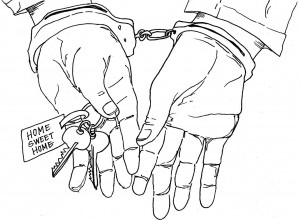Homeless ex-convicts deserve second chance
Homelessness is a very difficult problem to combat and one that raises many different reactions.
To some, the homeless are seen as people stuck in a cyclical system caused by mistakes or sheer bad luck.
To others, the homeless symbolize a lazy resistance because of their inactivity and inability to find jobs, exacerbated by drug use and criminality. Thus, when issues of homelessness are discussed they are usually met with strong opinions, both opposed and in favor. This is the central issue in the recent argument over the Los Angeles County housing authority’s recent regulation changes relating to housing assistance.
Under the Section 8 program, the housing authority has 22,000 vouchers for government subsidized housing to give out based on a waiting list. But 510 of those vouchers are set aside for individuals who are case-managed by community-based groups and referred to the housing authority as being in need of housing assistance. The homeless are one beneficiary of this addendum.
In addition, a ban was lifted against homeless probationers and parolees. The program also saw a reduction in the amount of time an eligible individual cannot have been involved in a serious crime, from three to two years. The measure passed 4-1 in a vote of Los Angeles County supervisors last week, and it has received strong support for its predicted help in getting homeless people off the streets.
There is, however, a strong movement against the changes, as they are considered by some to be unfair.
The opposition cites that the waiting list for Section 8 housing assistance has 191,000 people on it, and these changes essentially make it possible to jump the line by being a homeless ex-convict. If one such individual is selected, they argue, he or she could jump ahead of people who have waited years for this aid.
It’s a very hard issue to sort out. On one side there are the homeless who might have committed crimes and up until this point had no chance to take advantage of this aid. On the other side, there are those who have waited years for the aid and run the risk of having to wait another year because there are only 21,490 vouchers available to them instead of the full 22,000. They are groups that have suffered great hardships and both need help.
These changes are not implemented to cause hardship to those that have been patiently waiting in line. Rather, the changes serve to help those in dire need, such as the homeless who could not have received this aid before. The 510 reserved spots existed before these changes, so the total number of vouchers available for the people waiting has, in turn, not changed as well.
It might cause some anger to think that these people are able to jump them in line by being ex-convicts. Supervisor Michael D. Antonovich, the only supervisor who voted against the changes, said that the policy “sends the wrong message — commit a crime, receive Section 8 housing.”
These people are looking at the changes in the wrong light. The regulations do not mean that you can somehow benefit from committing a crime. If you do, it will only delay the process further.
The number remains at 510, so the impact cannot be that widespread, and the presence of the community programs means that not just anyone will be selected for the aid. It is not a means to jump the line by committing a crime, but rather one of forgiving past offenses and allowing a select group of people the semblance of a second chance.
Being in the middle of a large city like Los Angeles, USC is not removed from the issue of homelessness. There are usually homeless individuals outside of campus who cannot be avoided. Despite the complete disconnect between the lives of these people and the life of the average USC student, these people are still, after all, people. And not only that, they are members of the community. It is of high importance for these issues to be recognized and considered, despite the alien nature of them to our own daily lives.
Daniel Grzywacz is a sophomore majoring in neuroscience and anthropology. His column “72 Degrees and Shaking” runs Wednesdays.


Excellent article, thank you for treating people fairly.
Thanks for responding to this issue in an educated way. Not only is this a compassionate response, it is the most economical as well.
We can choose not to offer them this support, but that will only mean they spend countless nights every year in other costly public systems (ER’s, jails, etc).
It is important for our public investments to be principled and cost-effective, and this change accomplishes both. Thanks for drawing light to this important issue.
Any homeless family with childeren should get those vouchers on a temp basis. Any single adult who has committed a violent felony is on their own. Any able bodied person with no kids who won’t work…NOTHING!